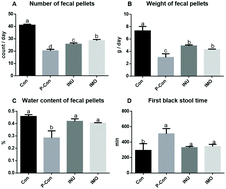Effects of inulin and isomalto-oligosaccharide on diphenoxylate-induced constipation, gastrointestinal motility-related hormones, short-chain fatty acids, and the intestinal flora in rats
Abstract
The prebiotics inulin (INU) and isomalto-oligosaccharide (IMO) influence intestinal health and immunity, but their effects on constipation are not clearly established. We evaluated the effects of INU and IMO in a rat model of diphenoxylate-induced constipation. Twenty-four male rats were divided into four groups: basal diet (Con), 40 mg kg−1 diphenoxylate (PCon), 20 g kg−1 INU and treated with 40 mg kg−1 diphenoxylate, and 20 g kg−1 IMO and treated with 40 mg kg−1 diphenoxylate. INU and IMO increased the number, weight, and water content of fecal pellets, and decreased the time to the first black stool in rats with constipation. Serum levels of the gastrointestinal motility-related hormones adrenocorticotropic hormone (ACTH), motilin (MTL), and Substance P (SP) were higher and corticosterone (CORT), vasoactive intestinal peptide (VIP), and calcitonin gene-related peptide (CGRP) were lower in rats treated with prebiotics than in untreated rats. Colon tissue levels of MTL and SP were increased, and VIP and CGRP were decreased by prebiotics. Furthermore, in rats with constipation, INU and IMO increased the colonic contents of short-chain fatty acids. The relative abundance of Bacteroidetes was lower in the prebiotics groups than in the Con and PCon groups. Lactobacillus was more abundant in the INU and IMO groups than in PCon rats. Lactobacillus reuteri and Lactobacillus intestinalis were more abundant in the IMO group than in the PCon group (P < 0.01), and L. intestinalis was more abundant in the INU group than in the PCon group (P < 0.01). In summary, INU and IMO improved constipation and altered the intestinal microbiota in a rat model of constipation.



 Please wait while we load your content...
Please wait while we load your content...